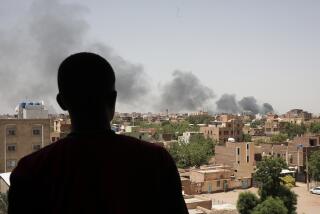World leaders look for way out of Libya
- Share via
Reporting from Tripoli, Libya, and Washington — With questions growing about NATO’s air war and international arrest warrants threatening to close off a diplomatic solution, new players are joining the search for a way out of the Libya conflict. But the efforts have stumbled so far on Moammar Kadafi’s insistence that he remain in the country.
Russia and Turkey have recently added their voices to Western demands that Kadafi leave. Libyan officials long have declared that a nonstarter, and diplomats say it is unlikely they can change Kadafi’s mind.
However, they hope to convince enough of the leader’s children and closest associates that leaving Libya becomes the only realistic option.
Adding urgency to the diplomatic push are concerns about how long NATO can sustain its military campaign and a pending ruling by the International Criminal Court on prosecutors’ request for arrest warrants for Kadafi, his son and brother-in-law.
Issuance of arrest warrants could forestall a solution in which Kadafi goes into exile. Once warrants are issued, other countries that have agreed to ICC jurisdiction would be required to arrest him.
“To insist that he both leave the country and face trial in the International Criminal Court is virtually to ensure that he will stay in Libya to the bitter end and go down fighting,” the International Crisis Group, a nonprofit organization that seeks to resolve global conflicts, said in a recent report on Libya.
Britain’s top naval commander, Adm. Mark Stanhope, said Monday that it could be difficult to continue the campaign in Libya past September. “Beyond that, we might have to request the government to make some challenging decisions about priorities,” he said.
The overall head of the British military, Gen. David Richards, contradicted him. But the admiral’s remarks reinforced criticism last week by outgoing Defense Secretary Robert M. Gates of NATO allies’ faltering commitment to the Libya campaign.
Fewer than half of the North Atlantic Treaty Organization’s 28 member nations are engaged in the conflict, Gates said, and after only 11 weeks some are beginning to run short of munitions.
Secretary of State Hillary Rodham Clinton on Friday cited “numerous and continuous discussions” but acknowledged that there was not yet a clear path to forcing Kadafi to give up power.
Leading the latest effort to persuade Kadafi to go is longtime ally Russia.
Russia’s Africa envoy, Mikhail Margelov, has suggested that the ICC case against Kadafi, his son Seif Islam and the regime intelligence chief could be deferred if the Libyan leader agreed to leave soon.
Margelov, who visited the rebel stronghold Benghazi last week, told Russian media that he planned to visit Tripoli on Thursday and stress to Libya’s leader that time was running out.
“The main international guarantee for Mr. Kadafi is his own common sense and his understanding of the calendar,” Margelov said. When ICC prosecutor Luis Moreno-Ocampo filed his request in mid-May, he said it would take at least three weeks for judges to make a decision. Margelov suggested that there were only a couple of weeks left.
“The clock is ticking, and there is time to do something in two weeks,” he said Saturday in a television interview.
Turkey, a growing regional power, also has had cordial relations with Kadafi. But last week, it also publicly offered to facilitate his departure.
“We said we would help you leave for wherever you would like,” Turkish Prime Minister Recep Tayyip Erdogan said his government informed the Libyan leader. “Kadafi has no way out but to leave Libya.”
In Tripoli, the government publicly continues to reject any peace blueprint that sets Kadafi’s exit as a precondition.
“No one can come here with a plan that includes the departure of the leader,” Musa Ibrahim, chief government spokesman, said Sunday. “This tells us that people are not interested in peace and democracy in Libya. They are interested in implementing a foreign agenda in Libya.”
Nonetheless, diplomats and others say avoiding an international tribunal could be an incentive for Kadafi and his extended family to leave.
They cite the cumulative pressure of being in the cross hairs of NATO’s aircraft. Although the government denies it, reports circulate that Kadafi’s wife and daughter have left the country. Kadafi’s youngest son and three grandchildren were reportedly killed in a NATO airstrike in April. Several people who have seen Kadafi in recent weeks said he remains visibly distressed by their deaths.
One Western diplomat said some of Kadafi’s aides have started exploring what options might be open to the leader if he is willing to give up power. Aides have asked whether Kadafi could stay in Libya, perhaps with his tribe. Although the main rebel group has steadfastly rejected such suggestions, discussions continue, the diplomat said.
“Kadafi may be beginning to understand that he’s in a complicated spot,” the diplomat said.
A second Western diplomat said Kadafi is losing ground with a steady stream of defections. “We think we’re getting closer to what we’re looking for,” the diplomat said. “But we’re not there yet.”
McDonnell reported from Tripoli and Richter from Washington.
More to Read
Sign up for Essential California
The most important California stories and recommendations in your inbox every morning.
You may occasionally receive promotional content from the Los Angeles Times.











